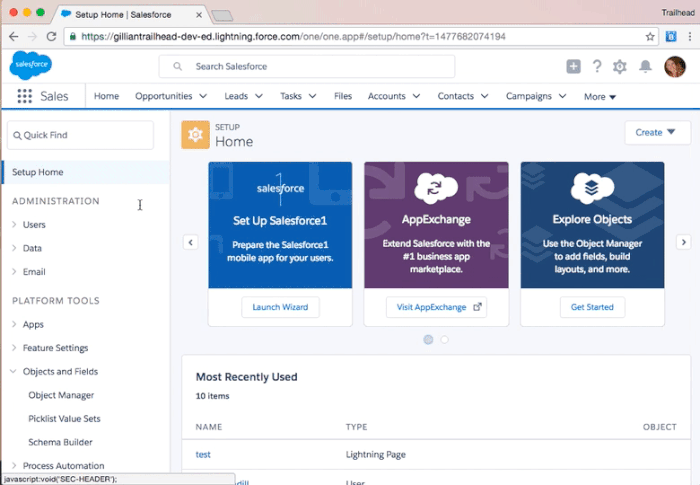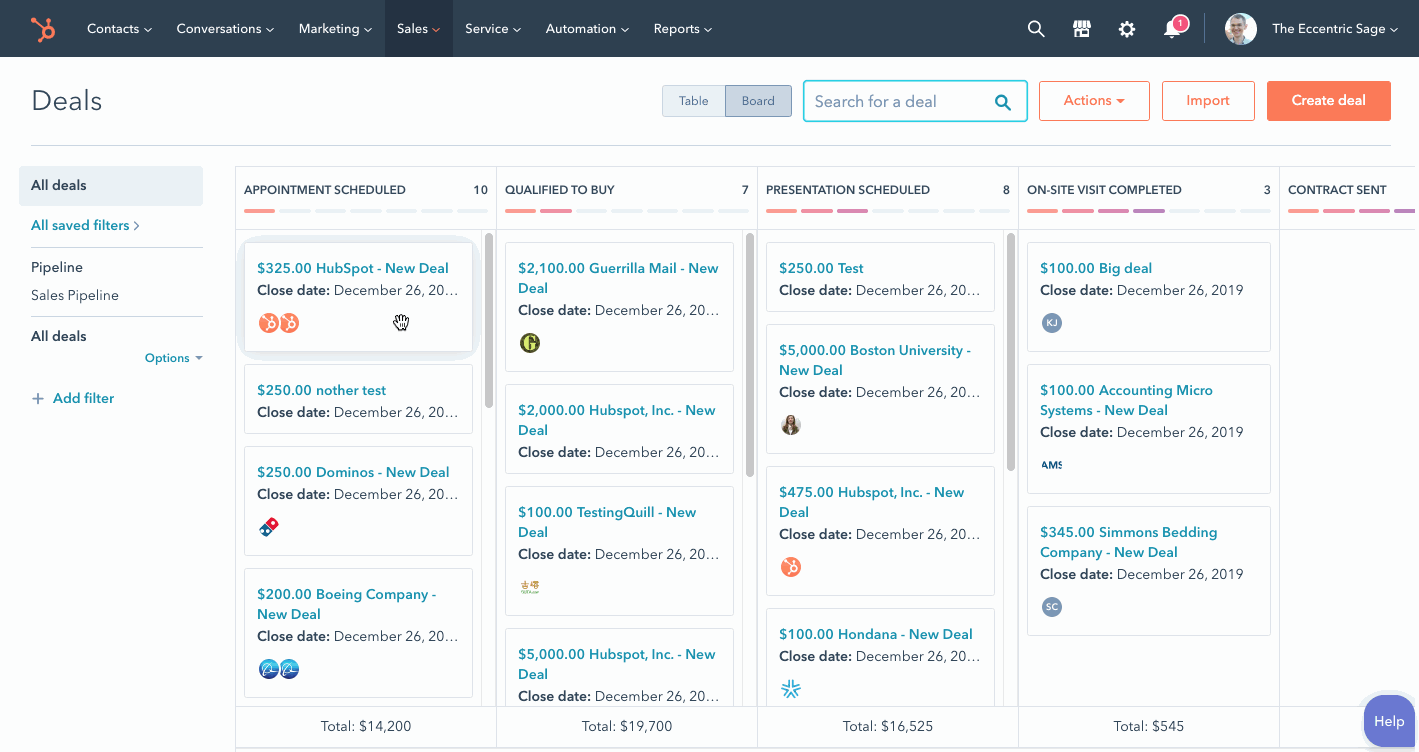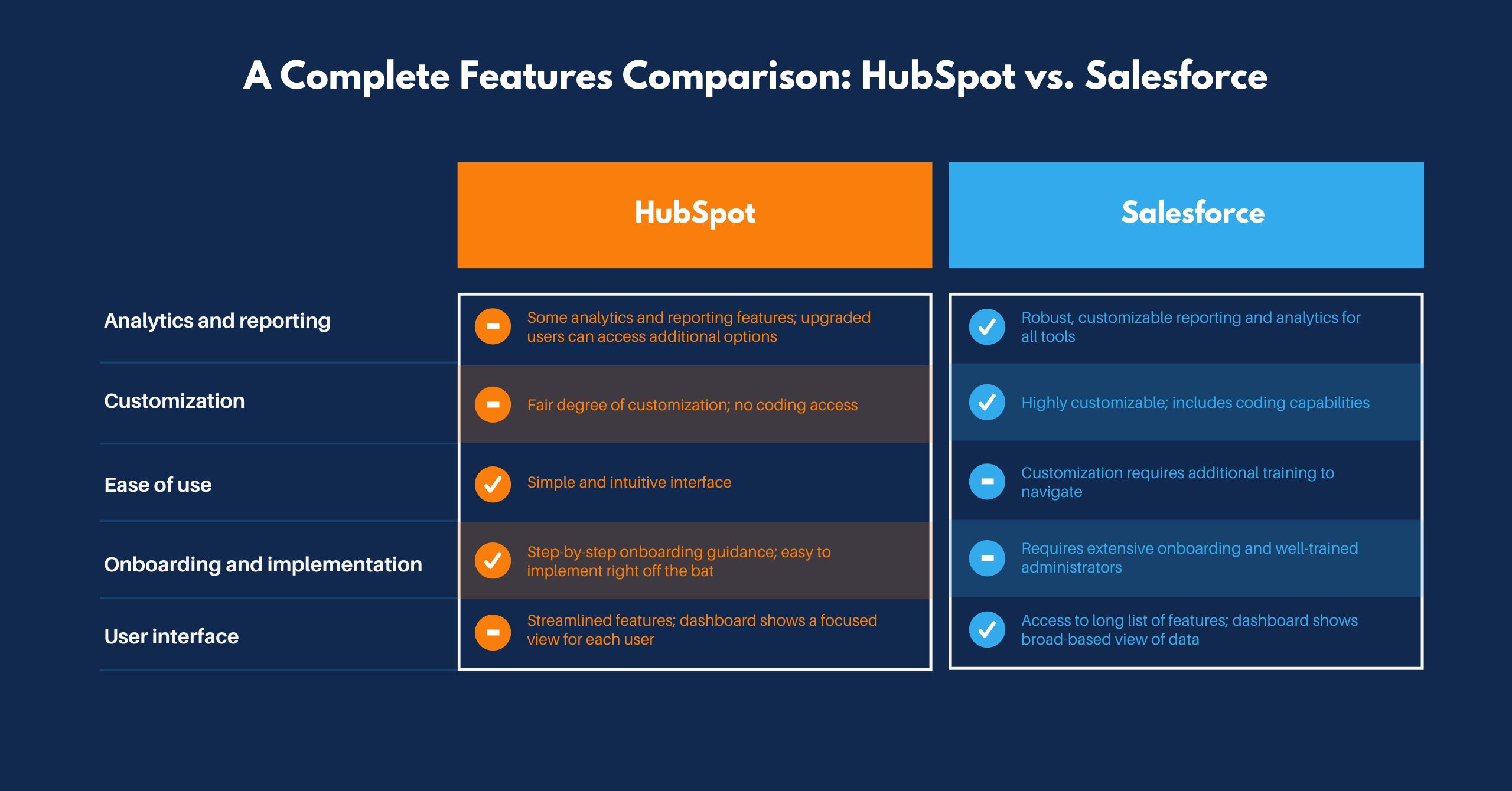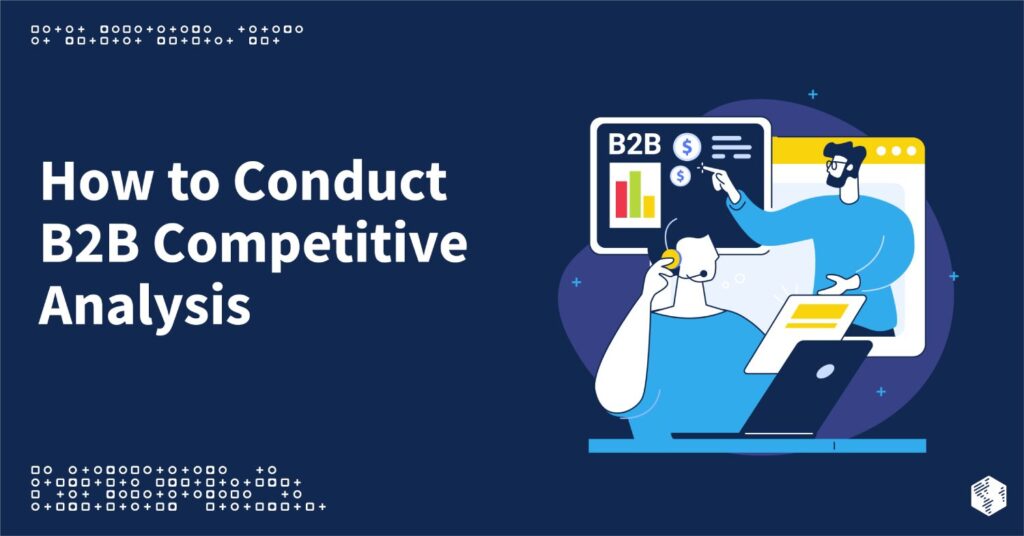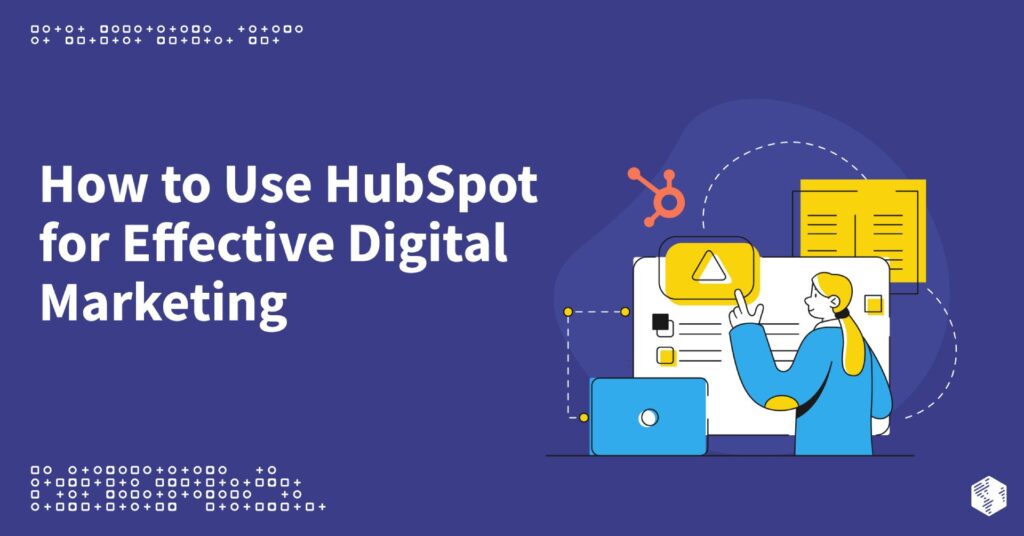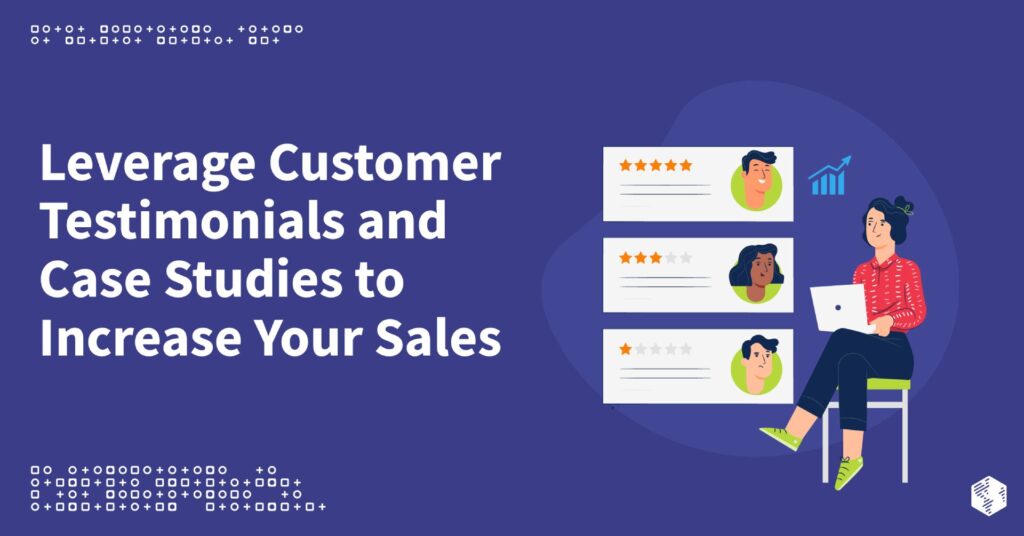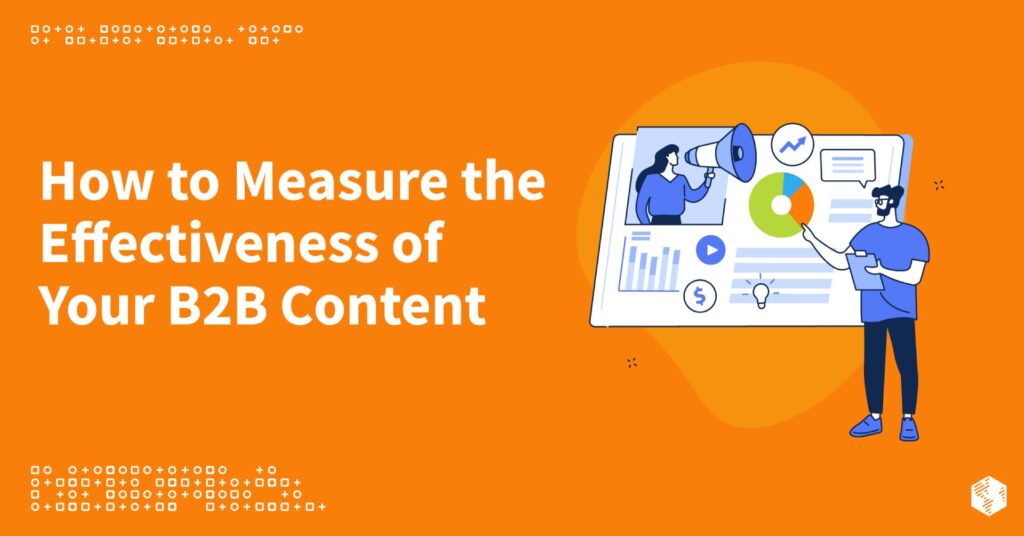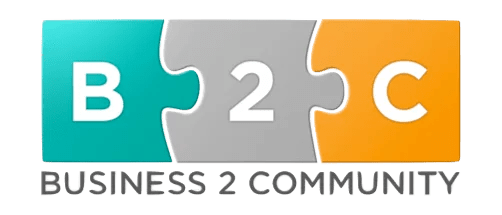If your business-to-business (B2B) company wants to increase revenue and ensure steady growth, you need to adopt a system for managing relationships with your customers.
The solution? Customer relationship management (CRM) software.
Your B2B organization needs to choose and implement a CRM platform that fits your unique needs.
HubSpot and Salesforce are two of the most well-known CRM solutions available today, and both are highly popular in the B2B marketing landscape. We’ve created this guide to compare their features and help you decide which CRM platform is right for you.
An Introduction to CRM
CRM software is intended to manage customer relationships and interactions across the entire customer lifecycle.
These systems provide a unified source of information on both current customers and potential leads so that everyone—from marketing to sales to customer success—can access, organize, manage, and use customer data.
With a CRM platform in place, your B2B company can focus on automating processes without sacrificing personalized relationships with individual customers.
How CRM Systems Work
CRM tools help B2B organizations stay connected to customers throughout the buyer’s journey. You can store customer information into a central location and make it available to anyone at your company, keep track of service issues, and otherwise manage relationships with your business contacts.
Customers enter the CRM system in several different ways; for example, they may fill out a contact form on your website or enter their email address when requesting a product demo. Then, as they continue to interact with your company, your sales representatives will update the customer’s data to reflect any new and relevant information. With that data, your marketing and sales teams can determine the best way to appeal to that customer and meet their needs.
CRM software platforms make it possible to streamline processes, stay connected with individual customers, and create a better customer experience—all of which are essential parts of increasing revenue.
Benefits of CRM Technology
The best CRM platforms on the market offer a variety of benefits:
- Stores all customer data in one consolidated platform
- Create a single point-of-access for customer-facing teams
- Keeps track of a customer’s previous interactions with the company
- Speeds up communication with customers
- Improves customer satisfaction
- Automates the sales lifecycle
- Provides an overview of your customer database
- Makes it easier to share information across teams
- Streamlines the handoff procedures between sales and customer success
No matter what CRM solution you use, the goal is to increase sales, improve the customer experience, and consolidate customer data.
Salesforce
Salesforce is a cloud-based platform with the goal of unifying all customer-facing departments within an organization under one CRM system. Every workflow, data source, app, and team can come together under Salesforce.
The platform offers limitless customization and scalability, which makes it a great tool for B2B companies of all types and sizes. Salesforce also offers a wide range of additional applications and integrations, which means you can create your own experience by selecting what products you want to use.
You can start a free trial of Salesforce to see if the CRM platform is a good fit for your business.
HubSpot
HubSpot—a cloud-based CRM platform—is a powerful and intuitive option for B2B companies at every stage. It features a unified suite of marketing, sales, customer service, and content management software that is intended to help organizations throughout the entire customer journey.
With HubSpot’s unified and accessible interface, team members across your customer-facing departments can easily create content that attracts leads, deepen relationships with clients, and manage revenue growth on one dashboard.
Get a demo or try HubSpot for free to learn more about this CRM platform.
A Complete Features Comparison: HubSpot vs. Salesforce
While there is a long list of CRM platforms on the market today, HubSpot and Salesforce are two of the most popular and widely used options.
Both HubSpot and Salesforce offer full CRM systems intended to help B2B companies manage relationships with clients and provide the best possible customer experience. They have similar audiences, purposes, and features, which is clear when you compare these platforms side by side.
However, differences begin to emerge when you look at how these CRM platforms were built and breakdown the features they offer.
Let’s dive a little deeper into the differences between HubSpot and Salesforce.
Analytics and Reporting
When it comes to analytics and reporting, Salesforce takes the cake.
Salesforce has robust, customizable reporting capabilities built into all tools. Additionally, the platform offers several different types of interactive graphics and charts—perfect for data visualization.
HubSpot provides analytics and data reporting features, but not as many as Salesforce, and its capabilities are limited unless you upgrade to a more expensive package.
Customization
With a standard HubSpot plan, you have some ability to customize workflows and features. Upgrading to a paid plan opens the door to additional customization options. Either way, there is no coding access, and it doesn’t come close to what Salesforce has to offer.
Salesforce’s CRM platform is highly customizable. Thanks to coding capabilities, you can add new features, control pipeline and workflow customization, and build nuanced forecasting dashboards. However, this level of customization may require the help of experienced developers or administrators.
If you are looking for a greater degree of customization, flexibility, and scalability, Salesforce may be a better fit for your B2B organization.
Ease of Use
HubSpot’s greatest strength is in its ease of use. The platform is built for simplicity—in fact, sales representatives, managers, and admins should be able to access and use the CRM software from the beginning. That means less time and fewer resources have to be dedicated to training.
Alternatively, using Salesforce has a higher learning curve and requires more training. Since the system is so robust and customizable, it takes time to learn how to navigate the dashboard and access individual apps.
While HubSpot is easier to use, some B2B companies have established IT teams that can help manage and customize Salesforce to be more accessible for your sales staff.
Onboarding and Adoption
With an intuitive onboarding program and step-by-step guidance, HubSpot is easy to set up and implement. Even first-time users can pick up on how to navigate the dashboard, automate tasks, and manage customer interactions.
The onboarding and adoption process for Salesforce is longer and can be more complicated. Leveraging the platform’s full features requires significant technical experience. There’s no out-of-the-box usability, and setup is likely too complicated for most sales representatives. Most of the businesses that use Salesforce either consult with an experienced agency or hire full-time Salesforce administrators to implement the system.
User Interface
HubSpot’s user interface is streamlined, limiting the display to essential features. While sales representatives can view the entire CRM, the dashboard shows a focused view for each user—making it easier to stay on task.
Salesforce provides users with access to a long list of features, which may be overwhelming for beginners. Additionally, the CRM dashboard shows a high-level view of all customer and sales data, most of which is not relevant to the average sales representative but may be incredibly useful to managers and revenue operations teams.
HubSpot or Salesforce? Like Comparing Apples to Oranges
Since HubSpot and Salesforce are powerful, robust CRM platforms that offer a wide variety of features, how do you decide which software is the best fit for your B2B company?
There is significant overlap between these two options, but some differences stand out. While Salesforce has more features and integration options, an advanced sales and pipeline management system, and is highly customizable, the benefits come with a higher price and steeper learning curve. HubSpot, on the other hand, has a simple and easy-to-use interface, is more budget friendly, and has extensive tools for marketers, it doesn’t have the extensive features and integration options of Salesforce.
The good news? These platforms can also work together.
If you want to, say, use HubSpot’s free marketing tools with Salesforce’s CRM, you can set up an integration between these two systems.
The choice is entirely up to the unique needs and preferences of your B2B company.
It’s Time to Invest in a B2B CRM Platform
Whichever CRM software your B2B company decides to adopt, we can help.
At OneIMS, our team of CMS experts is ready to help your organization adopt a CRM platform to become better aligned and integrated. We have the strategies, solutions, and tools you need to implement the platform across all customer-facing teams, integrate CRM into your overall marketing and sales processes, and transform your business into a revenue-generating machine.
We have a long history of working with companies in a variety of industries to develop innovative and data-driven marketing solutions, and we pride ourselves on producing measurable and sustainable results.
But you don’t have to take our word for it. View testimonials from our clients and read our blog to get an idea of our training, experience, and track record of success.
Are you ready to take the next step in revolutionizing the customer experience for your current and future clients? Schedule a consultation with us today to get started.



